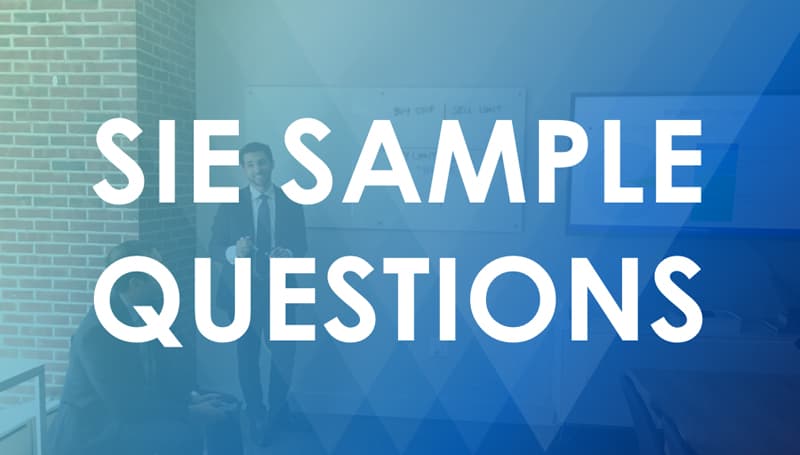What to Expect from Product and Rule Questions on the SIE Exam
Filed in: SIE Exam, Study Tips

What Topics does the SIE Exam Cover?
Now that the SIE has officially launched, it is important for candidates to understand how the information is tested so they can best prepare for and pass the exam. The content on the exam is broken down into four major topic areas, detailed below, which the regulators believe encapsulate all the fundamental information that individuals entering the securities industry should know.
| Section | Description | Percentage of Exam | Number of Questions |
| 1 | Knowledge of Capital Markets | 16% | 12 |
| 2 | Understanding Products and Their Risks | 44% | 33 |
| 3 | Understanding Trading, Customer Accounts, and Prohibited Activities | 31% | 23 |
| 4 | Overview of the Regulatory Framework | 9% | 7 |
| Total | 100% | 75 |
Types of SIE Questions
As indicated above, understanding products and their risks makes up close to half of the SIE exam. This includes questions on equity securities, fixed income, mutual funds, as well as basic options strategies and calculations. These products are also tested on the new Series 7 Top-off exam. Because the different securities are tested on both exams, you can expect the SIE to include short definitional questions on these topics, whereas the Series 7 Top-off will delve deeper into more scenario-based suitability type questions.
One topic that was largely eliminated from the new Series 7 Top-off exam is industry rules and regulations. Because this content is solely tested on the SIE exam, candidates should expect the regulatory questions they encounter to be longer and more detailed, especially in comparison to the product type questions mentioned above.
Download Your Free SIE Practice Question Set
Sample SIE Questions
The below examples illustrate the differing style of each question type.
Product Question Examples:
- An owner of an ABC corporate bond is a(n)
a. owner of ABC.
b. customer of ABC.
c. creditor of ABC.
d. analyst of ABC.
- The holder of an XYZ call option is
a. bearish on XYZ.
b. Bullish on XYZ.
c. an investor in XYZ.
d. eligible for dividends on XYZ.
- Municipal bonds are most attractive to retail investors because
a. the bonds are not SEC registered.
b. the bonds are long term investments.
c. the bonds pay interest free from federal income taxes.
d. the bonds are publicly traded.
As mentioned above, expect the product questions on the SIE exam to be short (one to two sentences at most), primarily definitional, and straight to the point.
Rule Question Examples:
- A customer informs his registered representative that he will be traveling extensively over the next few weeks and asks his rep to monitor his account and ‘do any trades that he thinks present a good opportunity for the client’. The RR should tell the client
a. that he will not be able to place any trades in the account because he is not an actual owner of the account.
b. that he will need to check with his operations manager before executing any trades for the client.
c. to send a notarized letter to the firm authorizing the RR to place any trades while the client is traveling.
d. that he will need a power of attorney to effect any trades on the client’s behalf.
- A registered representative has become friends with an employee in the back office, who assists in the processing of trades for the firm. When the rep effects trades for his clients, he offers to share some of his commissions with his friend, as his way of thanking him for his help. This arrangement is
a. acceptable if approved by the firm.
b. acceptable if the arrangements are documented in an official record.
c. prohibited, unless approved in writing by an operations manager.
d. prohibited, as unregistered persons cannot receive commissions.
- Broker-dealer A has received an order from a customer to purchase 10,000 shares of XYZ Inc. This stock has had an average daily trading volume of 175,000 shares over the previous 90 days. Prior to executing this order, the broker-dealer purchases 15,000 shares of XYZ for one of its proprietary accounts. The execution of this order by the broker-dealer for its proprietary account
a.would be considered insider training and require the broker-dealer to suspend its trading operations.
b. must be reported to TRACE within 10 seconds to ensure accurate documentation of the trade.
c. may be deemed front running by the firm, for which FINRA may initiate regulatory action.
d. must be cleared by the compliance department in advance given that a customer order has been received for the same security.
As illustrated here, expect the regulatory questions to be longer and go beyond straight definitions and memorization. Instead, the SIE exam will ask candidates to apply their knowledge and understanding of the rules in different scenarios.
Answers to product questions: 1) C, 2) B, 3) C
Answers to rules questions: 1) D, 2) D, 3) C
Written by Ian Franklin
Ian has personally trained over 10,000 students for their qualification exams. As Managing Director of Product Development, Ian is a key driver of the Knopman Marks SIE program, building the textbook, question bank, and diagnostic exams, as well as following up with every trainee enrolled in our program. In addition to the SIE exam, Ian provides training for the Series 3, 7, 50, 52, 57, 63, 65, 66, and 79 exams, and offers one-on-one tutoring to students seeking additional instruction. He graduated with college honors and received a BA from Washington University in St. Louis.
Related posts
- Read more
Exam Tips to Perform Under Pressure
High-stakes securities exams such as the SIE, Series 65, Series 79, or Series 24 can feel overwhe
- Read more
Efficient Exam Prep for Busy Professionals: Strategy Advising
Studying for a high-stakes securities exam like the Series 24 or Series 79 isn’t just about putti
- Read more
Crush the SIE Exam with the Video Vault
Are you feeling overwhelmed by the sheer volume of Securities Industry Essentials (SIE) exam cont


